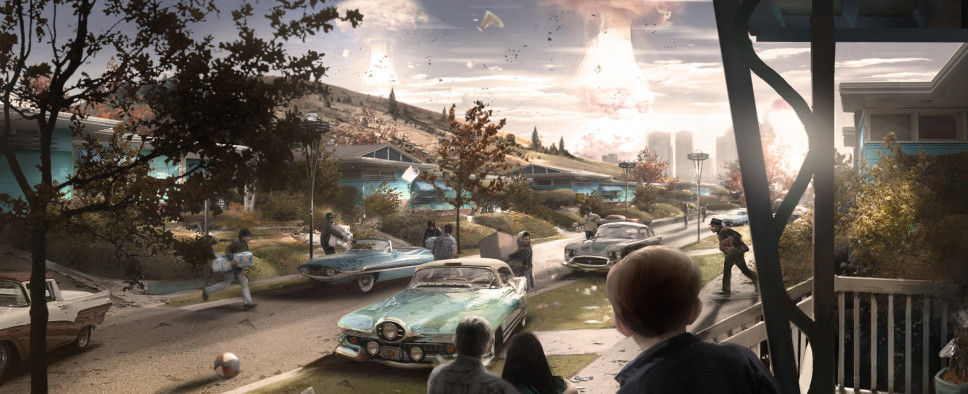Why Fallout is the Best Nuclear War Story Ever Told
-
Category: News ArchiveHits: 3700

A fascinating piece on Medium describes not only why the Fallout universe is so compelling for many of us from a gameplay perspective, but also where the series' art style, humorous-yet-deadly-serious propaganda, and overall 1950s-era vibe we take in during the course of each adventure originates from and is ultimately rooted. As a child of the late 1970s, I can't help but nod in agreement:
What makes the setting unique and not just another Mad Max ripoff is its retro-futurism. Its American history diverges from our own. Here, culture stood still in the '50s, and so technology advanced even though American culture did not.
So the wastes of the old world are an Googie nightmare, full of pulp scifi creations straight off the cover of a Jack Vance novel.
The art and propaganda posters from the era still litter the wastes. The world of America before the last war is a Leave It to Beaver Hellscape'Š 'Šan America that never existed save in the fevered imagination of conservative pundits.
Strong-jawed men grin behind tobacco pipes while women bring them slippers. Little Timmy wears a beanie with a propeller and the family dog chases the family robot through a tasteful colonial two-story. It's nostalgic, cute and wonderful.
But play the games long enough and you'll realize that the nostalgia masks a dark history. One where the Cold War's nightmare scenarios played out to a disastrous conclusion.
...
It's in this bleak, irradiated America that the games are set. Typically, the player begins as a vault dweller several generations removed from the nuclear war. All the character knows is the comfort of the vault. Then something goes wrong'Š 'Šand the player must explore the wastes to solve the problem.
It's a simple setup, and on the surface doesn't seem as if it should hold the title of the best piece of nuclear fiction ever written. To understand why I believe that, you need to understand my generation. I was born in 1983. I have only vague memories of Cold War.
I remember the fall of the Berlin Wall as something that occurred on TV while the adults in the room cried. I remember the collapse of the Soviet Union as a photo of Muscovites pulling down a statue of Lenin on the front page of the first newspaper I ever seriously considered.
The fall of the wall and the collapse of the Soviet Union were watershed moments in world history. It marked the end of an era of fear and anxiety that had permeated American culture for almost 50 years. But I was too young to properly understand that. The Cold War never scared me the way it frightened my parents or grandparents.

